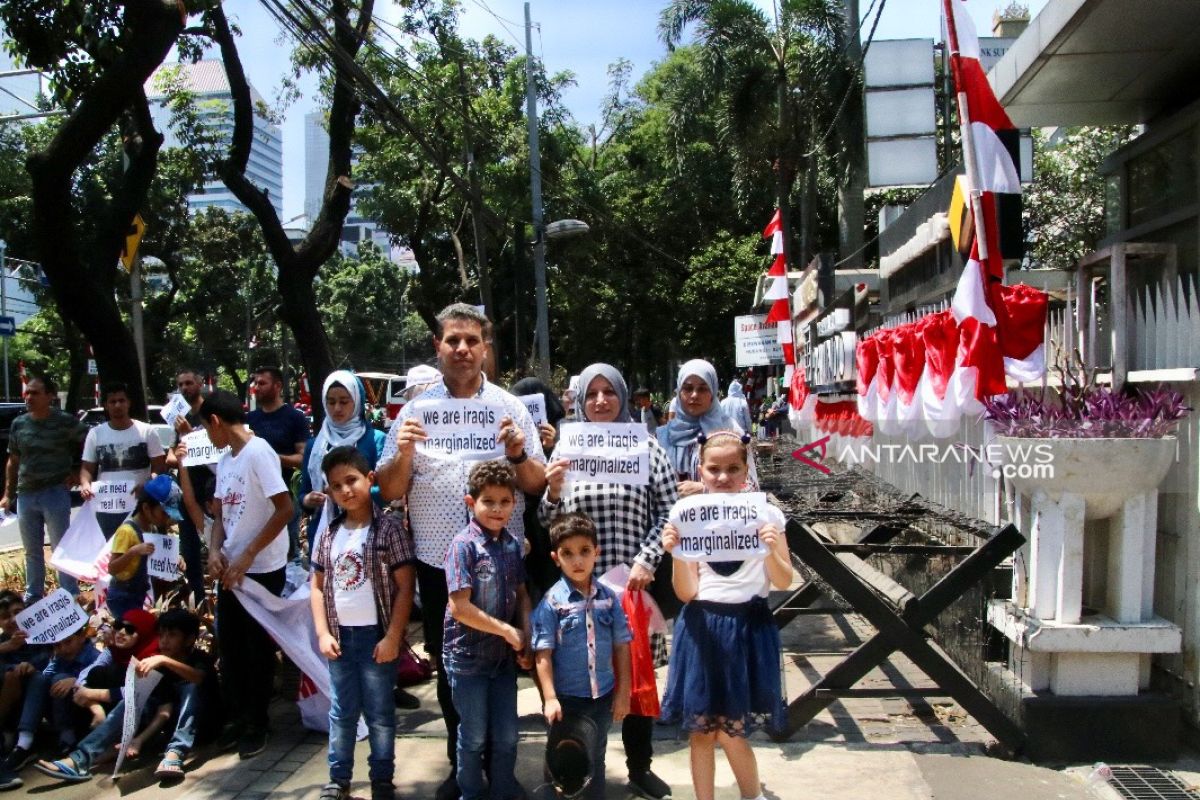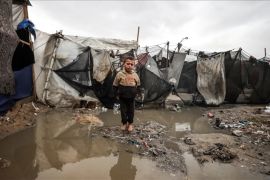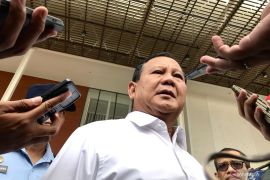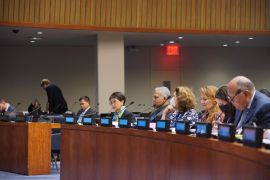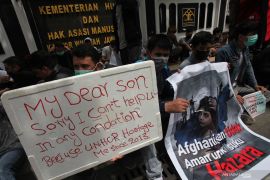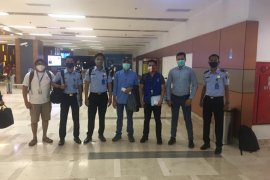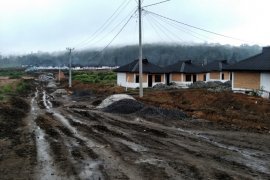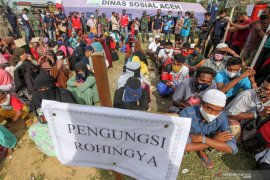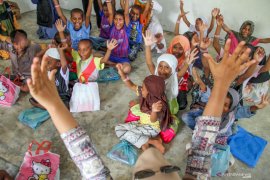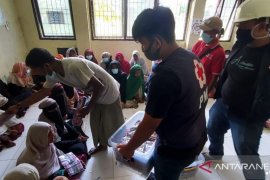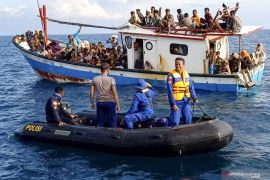"We are marginalized. We came here six years ago. My children face an unknown future,” Alnoori informed the media.
Alnoori stated that his youngest son, born in Jakarta as a refugee, had no nationality, as he had yet to be listed on either the Indonesian or Iraqi government’s population document.
The Iraqi refugees staged protests on several occasions and claimed to have negotiated with the UNHCR a fortnight ago and had ended the demonstration to give it some time, but to no avail, as the UN body neither took concrete action nor gave any form of promise.
The Iraqi refugees vowed to continue to protest until the time the UNHCR acts in their favor.
In Medan, North Sumatra Province, several refugees also rallied on the same day.
Related news: Refugees again rally in Medan asserting neglect by UNHCR
Related news: Iraqi refugees resume protest in front of UNHCR Jakarta Office
Ibrahim Basir, a Palestinian refugee, was displeased and annoyed over the fact that despite the refugees having resided in Medan for several years, their cause had been forgotten and that the UNHCR had yet to process matters over moving them to third countries, such as Australia, New Zealand, Canada, and the United States.
"We are bored of living like this. We just eat and sleep and are not allowed to find jobs," he stated.
Another refugee, Abdul, in Jakarta recently came clean of how nightmarish it was being a single refugee, as the process of obtaining refugees' basic rights has been complicated and lengthy.
"We have been here for seven years, but we remain deprived of our basic human rights," Abdul retorted, adding that the UN body solely processed the demands of refugees coming with their families but not for single refugees.
Alnoori, Basir, and Abdullah are just three of the thousands of refugees stranded for years in Indonesia, pinning hopes of someday being sent to third countries.
Most refugees are from conflict- or war-torn nations, including Afghanistan, Iraq, Palestine, Syria, Sudan, and Somali.
Based on the UNHCR data, Indonesia is currently home to some 14 thousand foreign refugees, mostly coming from Afghanistan, Syria, and Sudan, while some 600 of them are Iraqis.
In Indonesia, foreign refugees are found in Jakarta, Pekanbaru, Medan, Tanjung Pinang, Bintan, and Makasar, among others.
While staying in Indonesia, these refugees rely on financial aid from the UN funds managed by NGOs, the International Organization of Migration (IOM), and UHCR.
Every refugee receives Rp500 thousand (US$35.1) to Rp1.5 million (US$105) on a monthly basis.
The refugees admitted to the money given not being sufficient to live in a big city, including Medan, at a time when taking up jobs for a living is not an option for them.
The refugees resented the donations from other countries being cut by the IOM, and their children not being allowed formal schooling in Indonesia.
Frustration rides high among these refugees also due to the fact that they are not allowed to find jobs and their children cannot go to schools in Indonesia.
Jakarta has been facing troubles on account of the presence of refugees, since several of them lived on roadsides of the capital city and most were accommodated temporarily by the Jakarta administration.
Jakarta Governor Anies Baswedan, however, has decided to put the onus of refugee care back on the UNHCR and the central government.
The Jakarta administration will halt all forms of aid to refugees currently accommodated in Kalideres, West Jakarta, effective from August 31, 2019, according to the governor.
"The responsibility to care for refugees lies in the hands of the UNHCR. We, the Jakarta administration, have assisted them this far solely on humanitarian grounds to fulfill their basic requirements, while the UNHCR has yet to do its part. We, however, must return it (responsibility) to the authorities. That is what we are doing now," Baswedan remarked.
The governor pointed out that decisions pertaining to the status of refugees and asylum seekers and whether to deport or send them to third countries lie in the hands of the UNHCR.
"The decision to allow the refugees to stay in Indonesia's territory is not made by the provincial government but by the central government," he emphasized.
Related news: Baswedan puts refugee care onus back on UNHCR, central government
Speaker of the Jakarta Legislative Council (DPRD) Prasetio Edi Marsudi had earlier remarked that the DPRD met with officials of the Jakarta administration, UNHCR, and IOM to deliberate on refugee issues and Jakarta's decision to halt assistance to them.
Jakarta has, since the past 41 days until now, accommodated 1,500 refugees in Kali Deres, West Jakarta.
The Jakarta legislator stated that the UNHCR and IOM should have shouldered responsibility to take care of the refugees, with the central government’s assistance.
Director General of Multilateral Cooperation of the Indonesian Foreign Ministry Febrian Alphyanto Ruddyard earlier informed the press that the government had pushed UNHCR and countries ratifying the 1951 Refugee Convention to contribute to settling the issue of refugees and asylum seekers.
"The context is burden-sharing in that how they could assist us, as a transit country, in handling refugees instead of burden shifting in that they burden us and pretend not to know," Ruddyard had noted in Jakarta on Aug 7, 2019.
Indonesia expects the UNHCR to pioneer the implementation of the 1951 Refugee Convention and the countries ratifying the convention to demonstrate their moral and legal responsibilities.
The Foreign Ministry reaffirmed that the issue of refugees seeking clarity on how their plight in Indonesia can be alleviated is not the responsibility of Indonesia that does not ratify the convention.
In the meantime, currently, worldwide, there are over 70 million refugees and displaced people by war and violent conflict. In the initial 10 months of 2018, only 45,874 refugees were resettled to third countries.
According to the emergency appeal for 2019, a total of 132 million people were in need of humanitarian assistance in the coming years, as wars and conflicts are yet ongoing in Yemen, Syria, Libya, Afghanistan, Myanmar (Rohingya), and several African nations.
International Rescue Committee (IRC) President David Miliband affirmed that the high count of refugees and displaced people is "a wake-up call to the human cost of war, economic misery, and climate stress -- representing a clear international failure to tackle the defining political and humanitarian crisis of our time."
Related news: Indonesia encourages UNHCR to solve refugee issue
Related news: Some 400 foreign refugees hold rally in Tanjungpinang
Editor: Sri Haryati
Copyright © ANTARA 2019
